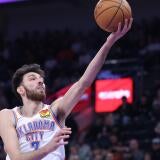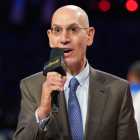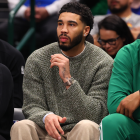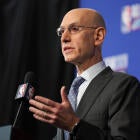
Mark Jackson's on the court work couldn't outweigh off the court
The Golden State Warriors fired Mark Jackson from being the coach because his on the court job didn't beat out the off the court job.

More postseason coverage: Playoff schedule, results | Latest news, notes
The Golden State Warriors have relieved Mark Jackson of his coaching duties with the team, which has brought about people questioning why he was fired when the team was so successful under him. The Warriors just enjoyed their best two-year stretch of basketball since 1990-92 by making the playoffs in back-to-back years and winning a total of 98 games in those two seasons.
And yet, it wasn't enough to get Jackson a contract extension he wanted, which would have made him a lame duck coach heading into the 2014-15 season. Instead, the team decided to part ways with Jackson now and look for an upgrade on the sidelines and less of a distraction away from the court. The Warriors were the darling surprise of last year's season and playoffs, invested big into the team this past offseason, and had high expectations heading into this season.
The expectations, fair or not, weren't met. After reinvesting $36 million (over three seasons) to Andrew Bogut in a contract extension and acquiring Andre Iguodala for $48 million (over four seasons), the Warriors were supposed to be contenders. That's what they sold to their fans. That's what the team expected to be. A natural progression and leap into the elite levels of the NBA was the next step, even with losing key bench players like Jarrett Jack and Carl Landry.
That's not what happened though. The Warriors jumped up four wins in the regular season and stayed right where they were relative to the rest of the Western Conference last season when they finished as the 6-seed. The team improved defensively, jumping from 13th in the NBA to third in the NBA from the previous season. The additions of Bogut and Iguodala, along with the defensive impacts of Klay Thompson and Draymond Green anchored a squad that was often putting David Lee and Stephen Curry out there together as well.
The improvement on defense though didn't meet an improvement on offense, relative to the rest of the league. The 10th best offense in the NBA in 2012-13 became the 12th best offense in 2013-14. The 13th best fourth quarter offense in 2012-13 became the 15th best fourth quarter offense in the 2013-14 season. The 10th best clutch offense a season ago because the 12th best clutch offense this season. These weren't big drop-offs, but they weren't improvements either.
The offensive system of the Warriors became less and less creative as assistant coaches moved on for various reasons. Michael Malone, who reportedly clashed with Jackson in his last season with the Warriors, took over the Sacramento Kings. Brian Scalabrine, a low level assistant the franchise appeared to be quite fond of, was relegated to the D-League after he couldn't be fired by the coach. Darren Erman, an up-and-coming assistant with the team, was fired for allegedly recording conversations without permission.
Golden State's internal structure surrounding the court was crumbling, which meant the on-court results would have to meet expectations of an owner growing tired of the clash with his coach. And once again, fair or not, this was going to be settled based on how much Jackson's team produced. It was enough for the fans, but it wasn't enough for the circus encompassing the team.
The offensive regression came from curious calls at key points in games and a basic system that didn't seem all that similar to the one dazzling us during the postseason run against the Nuggets and Spurs. The Warriors used more post-up possessions (up nearly one percent more frequently this season) while their spot-up scoring opportunities declined (roughly 1.5 percent fewer). The team used more of the pick-and-roll man (up one percent) than the pick-and-roll ball handler (down half a percent). Players came off screens for shots less often (down 1.6 percent) even though they were the second best team in the NBA at these shots.
While the overall percentages of these declines and increases don't seem like much individually, it had an overall cumulative effect on how maximized the Warriors' offense could be, as they continued to lose the support staff necessary for keeping game plans and adjustments as readily available as they needed to be. It's true that you need to be a good defensive team to be dangerous in the playoffs, and the Warriors accomplished that. But you can't regress offensively and expect to have the same impact you did a year ago.
That was ultimately the downfall of Jackson in the East Bay. The team's on-court execution and production was good, but it wasn't good enough to deal with the various off the court issues he created with a personality that clashed with ownership and management. Jackson wasn't a coach necessarily worthy of being fired for the job he did; it's just that the job he did couldn't make him impervious to circus he created away from the court.
The Warriors hung with a really good Clippers team, despite not having Bogut available. But the idea that they should have avoided that match-up altogether, and possibly host a first round series as a top 4 seed instead of sticking with the 6-seed, was an unavoidable grenade that Jackson's job security had to fall on. The team's improvement from last year to this year was superficial because relative to the rest of the league there wasn't real improvement at all. They were a better defense but a worse offense. They were a team that won more but remained in the same seeding.
It's not all Jackson's fault, but someone was going to answer for not living up to expectations with the organization willing to take the risk of looking for a better coach.
















